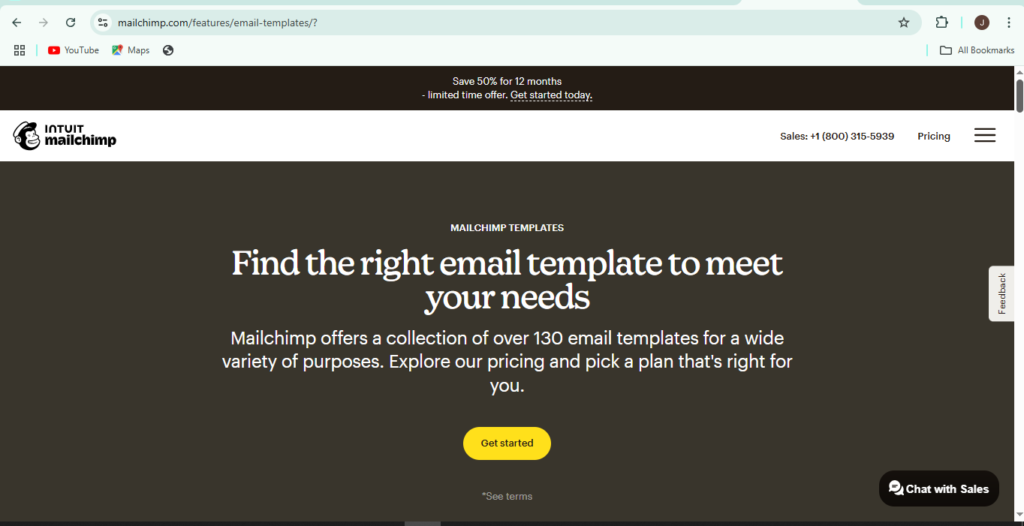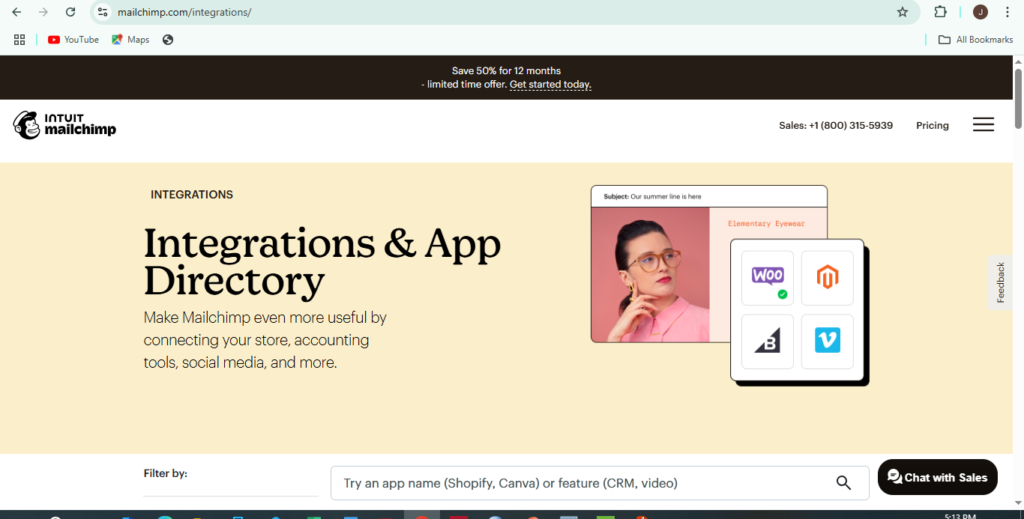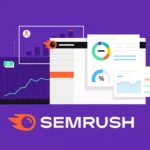Overview of Mailchimp
Mailchimp is a powerful all-in-one marketing platform specifically created to help businesses grow by working smarter, not harder, with email marketing and automation. Mailchimp began in 2001 as a basic email marketing company, and has since grown into a full-fledged all-in-one marketing platform that offers various services for email campaigns, customer relationship management (CRM), landing pages, automation, and so much more.
Today, Mailchimp has millions of customers from all over the world ranging from small start-ups to larger enterprises. The user-friendly interface, variety of features, and flexible pricing makes it a popular choice among businesses looking to enhance their digital marketing strategy.
Whether you’re sending out a newsletter, creating automated workflows to establish email campaigns, or evaluating customer data, Mailchimp gives you the tools necessary to manage and streamline your marketing campaigns—all in one place.
Ease of Use & Interface
Mailchimp is popular for various reasons including its easy and user-friendly interface. The format of the service is simple and straightforward, so anyone can easily understand how to use its features regardless of their previous experience.
For example, his dashboard is clean and straightforward, and it holds everything you will need for your campaigns, audience, and reporting. Because of his drag-and-drop email creator, templates that are already designed for you, and step-by-step support, your email campaigns are quick and easy to set up using email campaigns.
All of that to say, even for first-time users, you can create and send professional-grade emails that don’t require any technical skill. More so, Mailchimp provides very helpful tips and tutorials throughout the program, which allow the learning curve to come gradually for newbies.
In general, Mailchimp is the right blend of complicated features along with simple functionality. This is why it is a top choice for businesses who want to start marketing campaigns easily and quickly.
Email Marketing Features
Mailchimp provides an impressive suite of email marketing solutions that enable businesses to create, send, and measure email campaigns that work. Regardless if you’re running a newsletter or a billboard-sized campaign, you have access to the tools you need to get the results you’re looking for.
One key feature is the drag-and-drop email builder that makes it easy and fast to design professional emails. You can start with a pre-designed template, or start from scratch, the choice is yours.
Mailchimp also supports A/B testing, which allows you to test different subject lines, content, and time of the day to see what works best for you. This will help you improve your open rates and engagement rates over time.
Another key feature is email automation. With Mailchimp you can set up a variety of email automations like welcome emails, follow-ups, birthdays, and many more. Not only do you save time, you will be able to keep your audience engaged.
Mailchimp also offers advanced personalization and dynamic content, that will allow you to deliver messages tailored to individual subscribers based on behavior, preferences, or location.
Lastly, all campaigns come with in-depth analytics and reporting on opens, clicks, conversions, etc.

Audience Management
Mailchimp is a tool that makes audience management easy and productive, allowing business owners to keep their contact lists organized and able to reach their customers as effectively as possible. Rather than having to manage multiple contact lists stored on separate spreadsheets, Mailchimp offers one audience management dashboard where all your subscribers are located in one list.
Using this email marketing tool, you can segment your audience based on action, job title, location, past purchases, and much more. This allows you to send personalized emails to the right audience, at the right time and maximize your email engagement and conversion rate.
The platform lets you use tags and groups to:
- Identify and label contacts with different interests
- Keep contacts organized e.g by activity
- Create custom groups for your contacts, etc
This allows you to follow up and create highly targeted campaigns without having to think about duplicate lists that could cause confusion down the road.
In addition to audience management, Mailchimp also has very basic CRM features that allow you to see your audience’s subscriber profile, see how/if they have interacted with your communication, and add notes for future reference. You can also sync other data sources like eCommerce stores or other integrations that will let you see all the data related to your contacts.
Overall, Mailchimp’s audience management tools give you complete control over your contact list and is much more likely to ensure that your emails are always relevant and well-targeted.
Integration Capabilities
Mailchimp’s integration options are plentiful, making it easy to link up with the tools you already use. It doesn’t matter if you have a budding online shop, an extensive customer database, or a growing social media presence, Mailchimp can help you consolidate your marketing process.
This tool integrates with ecommerce platforms such as WooCommerce, Shopify, BigCommerce, and Magento so you can easily sync customer data, view purchase history, and send purchase recommendations for items they do not buy or cart abandonment emails.
Mailchimp integrates easily with CRM systems like HubSpot, Salesforce, and Zoho to help keep your contact records up to date and synced across all platforms.
Mailchimp manages a variety of integrations with social media channels like Instagram and Facebook, making it easy for you to create, and manage your ads directly from your Mailchimp account. You can also connect with several tools like Canva (for design), Stripe (for payments) and over 300 other apps offered in the Mailchimp App Marketplace.
Due to the plethora of integrations, Mailchimp is a one-stop shop for all of your marketing needs, making your life easier and streamlining your marketing efforts.

Analytics & Reporting
Mailchimp has in-depth analytics and reporting capabilities that allow you to gauge your email marketing performance. These are crucial for figuring out what’s working, what’s not, and what improvements can be made for future marketing endeavors.
With MailChimp, you can easily access open-rate, click-through rate, unsubscribe rate, and rates for advanced interaction, all from a very intuitive dashboard. Each campaign report includes a visual view of the performance metrics, providing a quick visual to analyze.
In addition to the campaign reporting, MailChimp also shows you audience engagement trends over time. You can see who interacts with the most, which links were clicked more often in the month, which email clients were used and where your emails were opened in the world.
If you are an advanced user, MailChimp allows you to access comparative reports, email heat maps, A/B test results, and more. Increased insights mean improved performance and better marketing effort for you and your customers.
You can embrace the analytics, use it to confidently decide, optimize your content, and allow for better results from every email campaign.
Pricing & Plans
Mailchimp has plenty of pricing plans to fit businesses of all types, sizes, and levels of sophistication. Whether you are just starting out or are already established, there is a plan.
Free Plan
Mailchimp includes the Free Plan option for small businesses or businesses just getting started in email marketing, offering specific feature sets that included sending campaigns and basic automation, sending up to 500 subscribers, and managing a view of audience contacts, for free, the Free Plan can help businesses send up to 3,500 emails per month for free.
Essentials Plan
Mailchimp has the Essentials Plan for growing businesses with specific requirements. At a low monthly cost, the Essentials Plan allows for A/B Testing (instead of just basic sending), email scheduling, and custom branding tools. The number of emails and maximum subscribers delivered varies based on tier level – with access to the basic features and ability to manage up to 50,000 subscribers.
Standard Plan
Mailchimp’s Standard Plan includes more sophisticated features for businesses with more sophisticated email marketing requirements. The Standard Plan also includes advanced reporting, retargeting ads and more powerful and complex automation workflows. And importantly, the Standard Plan has unlimited emails, as well as the ability to manage up to 100,000 subscriber contacts! It’s the best plan for businesses with bigger email lists.
Premium Plan
The Premium Plan is the best option for larger businesses and those that require the most advanced features, including all of Mailchimp’s features for marketing purposes (to include advanced segmentation, multivariate testing, priority support)! If you choose this plan, you can manage over 200,000 subscribers along with unlimited emails. Essentially, it is the most comprehensive option for high volume email marketers.

Deliverability & Performance
One of the most critical elements of email marketing is making sure that your emails land in your subscribers’ inboxes. Fortunately, Mailchimp understands this and has put tools in place to help you improve your email deliverability and performance.
Mailchimp has a good reputation with email service providers (ESPs), which helps ensure that emails sent from Mailchimp have a good probability of being delivered to inbox, rather than the spam folder. Part of the Mailchimp team’s process is to regularly monitor and maintain the sending IP addresses.
Mailchimp also offers tools that provide additional opportunities for increasing open rates and engagement by optimizing subject lines, content and delivery time. In addition, they offer A/B testing, where you can test different variables in your campaigns to see what resonates best with your audience and subsequently, improve campaign performance.
Mailchimp also offers spam filter testing to help you understand how spam filters might see your emails before you send them. This is incredibly important for avoiding email deliverability issues and improving your overall campaign performance.
To help improve performance, Mailchimp provides in-depth statistics to track the engagement of your emails, monitor the performance of your emails to adapt your strategy going forward. The real-time analytics show you those pesky issues fast, which is crucial for resolving these issues in your campaigns.
Pros and Cons
Pros of Mailchimp
- User-Friendly Experience
- Mailchimp is known for its simple, easy-to-use interface, which makes it equally well suited for beginners and more experienced marketers. With Mailchimp’s easy drag-and-drop builder, pre-built templates, and how-to articles, creating and sending an email has never been easier.
- Full-Featured Software
- With Mailchimp, you have a ton of features at your disposal for email campaigns, automation, analytics, audience segmentation, and plugins to popular eCommerce and CRM platforms. It is a great long-term fit for businesses of all sizes looking for an all-in-one solution.
- Flexible Pricing
- You can get started without a financial commitment on a plan that has enough core email marketing features for small businesses. While your business grows, Mailchimp offers paid plans that provide additional features and scale of business.
- Great Reporting & Analytics
- Mailchimp provides reporting based on performance that shows you open rates, click-through rates and conversions. Understanding the data from these reports can help grow your email marketing strategy with data-driven decisions.
- High Deliverability
- With a reputable relationship with e-mail service providers, security measures in spam filter testing, and e-mail optimization tools, Mailchimp has a solid reputation among legitimate companies that will help improve your email deliverability rates.
Cons of Mailchimp
- Limited Customization on Lower Plans
Mailchimp has a lot of functionality but restrictions on advanced customization options are buried in higher pricing options. If you are on a free (or lower tier plan) you will definitely have limitations on customization and functionality. - Pricing Can Get Expensive
As your subscriber base expands, Mailchimp has the potential to become quite pricey. Depending on the number of subscribers added or if you need more advanced features, your price will increase; this can obviously create challenges for businesses with large subscriber lists and/ or limited resources. - Learning Curve for Advanced Features
While Mailchimp is user-friendly with the basic functions, some of the other features are perhaps more advanced, such as automation workflows and segmentation. These features may require a little more work for new users to get used to. If you are a business looking for highly customizable solutions, you may want to factor in that some of this may come with a learning curve. - Limited Customer Support on Lower Plans
Users on lower-tier plans receive some customer support, but only offer priority support to users on the Premium Plan. Therefore, when timely support is needed and no means of assistance is possible due to the financial conditions of other offerings, this can be troubling for businesses.




